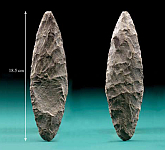
Click to enlarge
|
Figure 2. The Cinmar bipoint was dredged up in 1970 by Capt. Thurston
Shawn from the waters offshore from Hampton, Virginia. It is
named after the captain’s
ship. It came up with a mastodon skull which provided the radiocarbon
date of 22,760 +/- 90 RCYBP
(UCIAMS-53545). The depth of the find was from 38-40 fathoms in the Atlantic.
Note its bold, thin flake scars which are an attribute of Solutrean toolmaking. And, it has invasive retouching along its distal
margins resulting from resharpening dulled edges.
See "The Cinmar Bipoint – Virginia’s Oldest Stone
Artifact" in the 2020
Central States Archaeological Societies April journal.
|
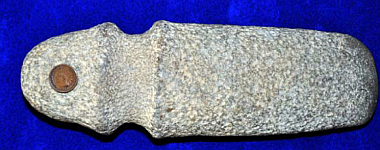
Click to enlarge |
Figure 5. Full-grooved axe (Approx. 10” length X
3-1/4” width).
See "The George L. Brooks Jr. Indian Artifact Collection: Cumberland
and Salem Counties, New Jersey" in
the 2020 Central States Archaeological
Societies April journal.
|
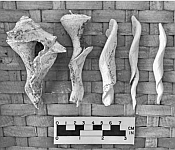
Click to enlarge |
Proposed sequence of reduction of whelk to finished awl or pin.
See "A Late Woodland Whelk Processing Station in New England" in the 2020
Central States Archaeological Societies April journal.
|
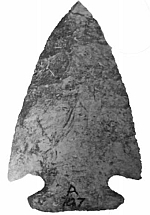
Click to enlarge
|
A corner-notched projectile point typical of those found
with burials in the excavated Norton mounds. Length: approximately 3 inches. Photo adapted from Flanders and Griffin (1970).
See "Hidden in the Woods: The Norton Mounds of Southwestern Michigan" in the 2020
Central States Archaeological Societies April journal.
|
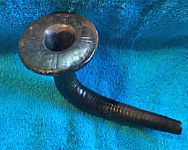
Click to enlarge |
Black Trumpet pipe with four double directional incised
marks on the rim. It is likely they indicate the four directions. The top
has a flat rim, and the stem is twisted.
See "Kirk Whaley’s Huron/Iroquois Pipes" in the 2020
Central States Archaeological Societies April journal.
|




